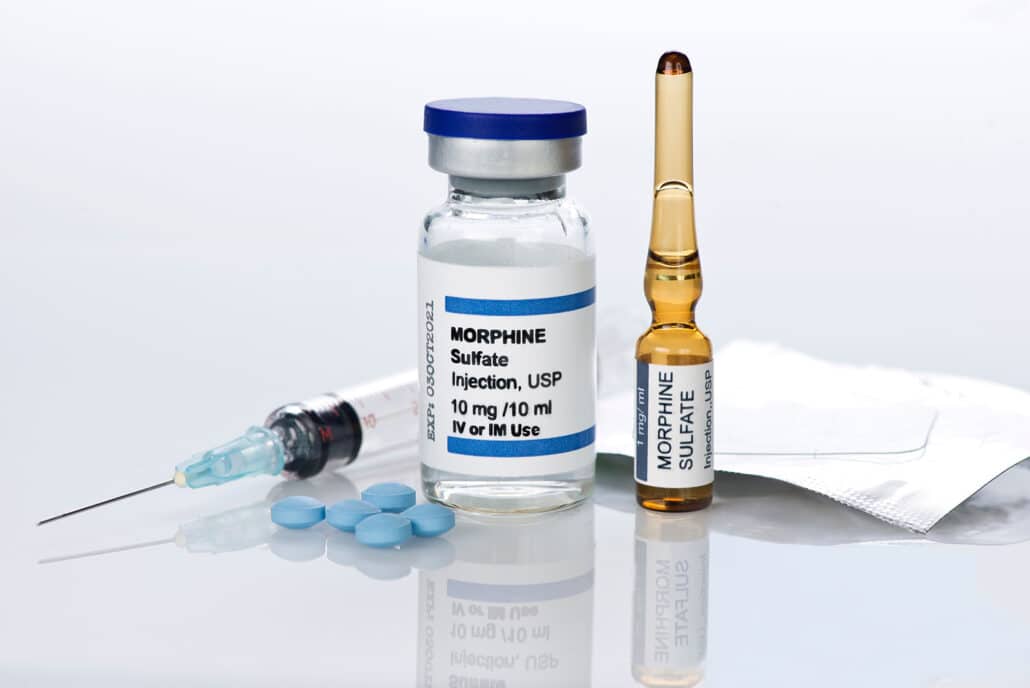Do you have a dependency on morphine and are worried about the withdrawal symptoms and detox process? Morphine is a powerful pain-killing medication that is typically given either by tablet or injection. However, it’s also a controlled substance and classified as a Schedule II narcotic, meaning that it has a high risk for misuse and addiction. However, if you do find yourself addicted to morphine, there is help available so that you can regain your sobriety.
Table of Contents
- 1 What is morphine and why do people take morphine?
- 2 How does morphine treat pain?
- 3 What are the side effects of taking morphine?
- 4 How do people get addicted to morphine?
- 5 What are some signs that someone should enter detox?
- 6 What are some signs that family members should look for when it comes to morphine addiction?
- 7 Should someone with a morphine dependency enter detox?
- 8 What are the symptoms of morphine withdrawal?
- 9 How are morphine withdrawal and morphine detox treated?
- 10 How long does morphine detox last?
- 11 What should individuals do after detox?
- 12 FAQ
What is morphine and why do people take morphine?
Morphine is a prescription medication that is used to treat severe acute or chronic pain. It is most often given in a hospital setting or prescribed by a doctor for chronic pain that hasn’t been alleviated by other types of medications or treatments. It is an opioid, meaning it is derived from the opium plant. It can be given by injection, oral liquid suspension, and by regular tablets or capsules or extended tablets and capsules. Some brand names for morphine in the United States include AVINza, Kadian, Morphabond, MS Contin, and Roxanol.

How does morphine treat pain?
Morphine helps relieve pain by blocking or interrupting the way the body and mind interpret pain signals through its action on opioid receptors in the nervous system. Individuals who take morphine will notice a reduction in their pain and may have feelings of euphoria. However, this pain relief and sedation can lead to misuse, especially if the drug is not taken as prescribed.
What are the side effects of taking morphine?
While morphine is taken to relieve pain, it can have some unwanted side effects. One of the most severe is difficulty breathing, which can be life-threatening. Other side effects include having a slow heart rate, feeling tired or drowsy, low blood pressure, nausea, and itching. These effects of morphine can significantly impact well-being and daily functioning.
How do people get addicted to morphine?
Morphine should only be taken as directed by a doctor and under the care and monitoring of a doctor. Depending on the type of morphine the individual is given for their pain, they will need to take it every 4, 8, or 12 hours, not any sooner than that. Taking morphine more frequently than prescribed or at a higher dose than prescribed can lead to dependency and addiction. Lots of people who find themselves with a morphine addiction were initially prescribed morphine to treat pain after a traumatic accident, surgery, or illness.
What are some signs that someone should enter detox?
Prolonged use of morphine can lead to increased tolerance, meaning that you have to take more morphine in order to feel the same effects. If you are taking more morphine than is prescribed by your doctor and spend time sourcing morphine from other individuals who may have a morphine prescription or outside of a pharmacy or your doctor’s office, you may be developing an addiction. Other signs you may be addicted to morphine include:
- You obsess over how to get more morphine.
- You have an extreme fear of running out of morphine.
- You use morphine with alcohol and/or other street drugs.
- You are severely constipated.
- You experience extreme drowsines
- You experience confusion.
- You have problems with dizziness.
- You fake injuries or deliberately harm yourself to get prescribed more morphine.
- When you try to stop using your morphine or reduce your dosages, you experience withdrawal symptoms.

What are some signs that family members should look for when it comes to morphine addiction?
Initially, it may be very difficult to tell if your family member or loved one has a dependency on morphine. This is because many people who use morphine do so for medical purposes. Initially, your loved one may have been in a severe car accident, injured their back, or had a severe and very painful illness that required a doctor to prescribe morphine for the control of their severe pain. However, if the individual is developing a dependency on morphine or has a dependency, you may notice changes in their behavior, including:
- Missing out on important social and family functions in order to find, purchase and use more morphine.
- Displaying irritation or aggression for seemingly no reason.
- Showing signs of weight loss, and the individual isn’t actively trying to reduce their weight.
- Failing to shower and bathe regularly or showing signs of poor hygiene
- Suddenly experiencing financial distress, possibly due to increased spending on morphine.
Should someone with a morphine dependency enter detox?
The safest way to stop the use of morphine is with medical help. This means that the individual who wishes to stop using morphine should be under the care and monitoring of a doctor. Suddenly stopping the use of morphine can lead to mild to severe withdrawal symptoms. Individuals who stop the use of morphine may feel their first withdrawal symptoms five to 12 hours after their last dose. Symptoms generally get worse for the next three days, usually peaking around 72 hours after the last dose. After the first three days, symptoms will slowly subside for the next seven days. However, some people may still feel symptoms and cravings after a month. It’s important to understand that detoxing is only the first step of the treatment process. Detoxification is the first step in the recovery process. To achieve long-term sobriety, most people need to enter an inpatient or outpatient drug rehab program.
What are the symptoms of morphine withdrawal?
Mild symptoms of withdrawal include having a runny nose and watery eyes. You may experience chills and excessive yawning as well as symptoms of insomnia. Other morphine withdrawal symptoms include:
- Nausea and vomiting
- Diarrhea
- Excessive sweating
- Increased or high blood pressure
- Depression and anxiety
- Moderate to severe headaches
How are morphine withdrawal and morphine detox treated?
For many patients, part of the detox process involves taking a medication in lieu of the morphine. This is called medication-assisted treatment or MAT. Medications typically offered for MAT include Suboxone, Methadone, buprenorphine, naltrexone, and naloxone for opioid overdose emergencies. Individuals may also receive various counseling and therapy services as part of their substance abuse treatment.

How long does morphine detox last?
When it comes to the body naturally getting rid of the morphine, it’s important to understand morphine’s half-life or the length of time it takes half your morphine dose to leave your body. For most individuals, it takes between 2 and 4 hours for half the dose of morphine to leave the body and 12 hours for the full dose of morphine to be metabolized by the body. After 12 hours, morphine is usually not detectable in the blood, but it can still be detected in saliva, urine, and hair. Morphine detox usually lasts about seven days. The bulk of the detox symptoms are usually felt within the first three days. However, the psychological effects and cravings can last up to and beyond 30 days.
What should individuals do after detox?
More treatment is typically needed after detox. Individuals can choose from inpatient or outpatient programs, like those offered at Long Island Interventions. Typical inpatient and outpatient treatments include dual diagnosis, behavioral therapy, group therapy, individual counseling, and various holistic treatments, including massage, yoga, and acupuncture. Your exact program will depend on your personal needs and the length of time you’ve been using morphine.
Please contact Long Island Interventions for information about Morphine Addiction Treatment near you.
FAQ
Is it ok to take morphine long term?

